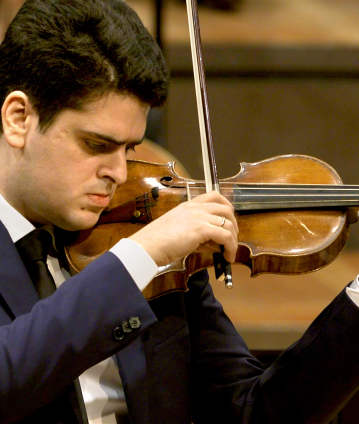Michael Barenboim’s and Vasily Petrenko’s debuts with the Berliner Philharmoniker

Schoenberg’s Violin Concerto demands everything from the soloist: tremendous interval leaps, awkward fingerings, breakneck tempos and richly nuanced expressiveness. Michael Barenboim presents all of this in his debut with the Philharmoniker. There are also two colourful works on the programme in which Ravel adapts the cultural heritage of other European countries: the Viennese Waltz in La Valse and an ancient love story in Daphnis et Chloé. Conductor is Vasily Petrenko, who also makes his debut with the Berliner Philharmoniker.
After the premiere in 1940, one critic wrote that Arnold Schoenberg’s Violin Concerto sounded like “feeding time at the chicken farm”. Not only audiences and critics but also Jascha Heifetz, for whom Schoenberg had originally intended the piece, reacted with hostility to the twelve-tone work. The reasons why Heifetz turned down the composer are not known. The first performance was then given by soloist Louis Krasner. The fact is, that the violin concerto is one of the most technically demanding there is: “Some of the playing techniques, particularly the double and triple stop harmonics, are very avant-garde here. Violinists at that time were not familiar with them in this form,” says Michael Barenboim, who performs this piece under the baton of Vasily Petrenko. Both make their debut with the Berliner Philharmoniker. For the young violinist, concertmaster of the West-Eastern Divan Orchestra which was co-founded by his father Daniel who is also its chief conductor, Schoenberg’s concerto is one of the great works of the 20th century. “It is highly expressive, very emotional, you shouldn’t let yourself be put off by the severity of the twelve-tone”, he says enthusiastically. The concerto is a stark contrast to Franz Schubert’s lyrical and serene Rosamunde Overture which opens the programme.
In 1823, Schubert had written incidental music for the play Rosamunde by the poet Helmina of Chézy. While the play was a failure, the music was a success. But the overture, despite its name, has nothing to do with the play. At a later date, a publisher printed Schubert’s overture to Die Zauberharfe as the prelude to the Rosamunde music. After the interval, the programme continues with two works by Maurice Ravel: La Valse, that ecstatic apotheosis of the Viennese waltz, in which the French composer draws performers and listeners into a breathtaking musical maelstrom. Ravel was commissioned by Sergei Diaghilev to write La Valse for a dance project by the Ballets Russes. However, Diaghilev rejected it on the grounds that the work is not a ballet, but a portrait of ballet. As a result, La Valse became world famous as a purely orchestral piece.
Ravel evokes an entirely different soundscape in his ballet Daphnis et Chloé which was also written for Diaghilev: lascivious, dream-like, bacchanalian. With the Suite No. 2, assembled from parts of the ballet and which begins with softly shimmering sounds of harp and flute and builds with enormous musical intensity to a Dionysian final dance, the Berliner Philharmoniker bring the programme to a close.
© 2018 Berlin Phil Media GmbH
Related interview